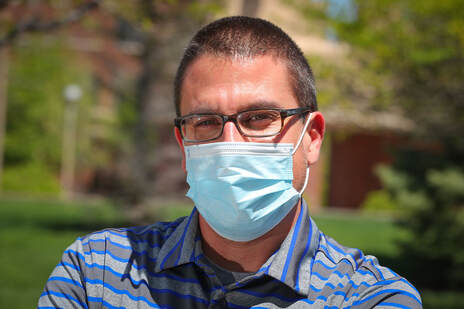|
By TYLER ELLYSON UNK Communications http://unknews.unk.edu/2020/06/12/unk-history-professor-uses-past-pandemics-to-help-people-understand-covid-19/ KEARNEY – The ongoing coronavirus pandemic will undoubtedly be remembered as one of the most significant events of the 21st century. COVID-19, the disease caused by the novel coronavirus, has infected about 7.5 million people worldwide and killed more than 420,000, according to Johns Hopkins University. And those numbers continue to rise. The global outbreak has crippled economies, closed schools, shut down sporting events and impacted nearly every aspect of our day-to-day lives. It’s clear we are living through history. But it’s not the first time Americans have faced this level of fear and uncertainty. University of Nebraska at Kearney associate history professor David Vail believes lessons from the past can help put the coronavirus pandemic into perspective. “History provides really important tools to help us understand and begin to address current problems,” Vail said. “It gives us context to see where we need to go moving forward.” Vail teaches an undergraduate history of science and medicine course each semester. His students happened to be studying disease outbreaks when the coronavirus reached Nebraska. “One of the things we’re learning about pandemics is we have to be proactive,” he said. Following this advice, Vail met with his students in early March and included them in the planning process before moving the course online for the remainder of the spring semester. Although they were meeting remotely, Vail made sure there were opportunities for collaborative projects and group discussions, allowing students to learn from each other and better process what they’re currently experiencing. “We all got to discuss what it’s like to live through this together,” Vail said. Campus resources played a key role in this process, too. “UNK’s Special Collections and Archives, as well as the G.W. Frank Museum of History and Culture, had numerous historical materials for students to draw on,” Vail said, “and the results were amazing.” Responding to increased student interest in the topic, Vail also created a history of global pandemics summer course that started this week. The online course for graduate students takes an in-depth look at how diseases have shaped global societies. “In addition to helping our graduate students explore the historical context of the current pandemic, David’s course displays the ability of our department and its faculty to offer relevant courses on short notice,” said Jeff Wells, chair of UNK’s Department of History. Connecting the past and present can help people navigate the current situation. Vail said there are many similarities, and differences, between the COVID-19 outbreak and previous global pandemics, and we can learn from the things that went right and wrong. In early April, he joined KRVN Radio’s Brandon Benitz for a two-part interview on the history of global pandemics, with a focus on the 1918-19 Spanish flu that infected an estimated 500 million people and caused at least 50 million deaths worldwide. “One of the most important parts of being a historian is to connect the history we teach and share the expertise we have with the general public,” said Vail, who is also featured in a monthly agricultural history report on KRVN. By gaining this background knowledge, Vail said people can better understand viruses, vaccines and the policies put in place to protect the public. For instance, debates over when to remove quarantine and social distancing measures – similar to those happening now – also occurred in 1918. Public health officials in the U.S. and elsewhere are also concerned about a second wave of COVID-19 this fall. The Spanish flu came in multiple waves, including a more deadly second wave likely caused by a mutated virus spread by wartime troop movements. Eased restrictions on community events also contributed to the flu’s impact in fall 1918, according to Vail. “It’s important to have that historical context,” he said. “That’s not to say historians are fortune-tellers, but I think it does help to understand where these tensions come from and how people in the past dealt with them.” Ultimately, Vail said, one of the best ways to defeat any disease is to get people working with each other, for each other. Comments are closed.
|
|

